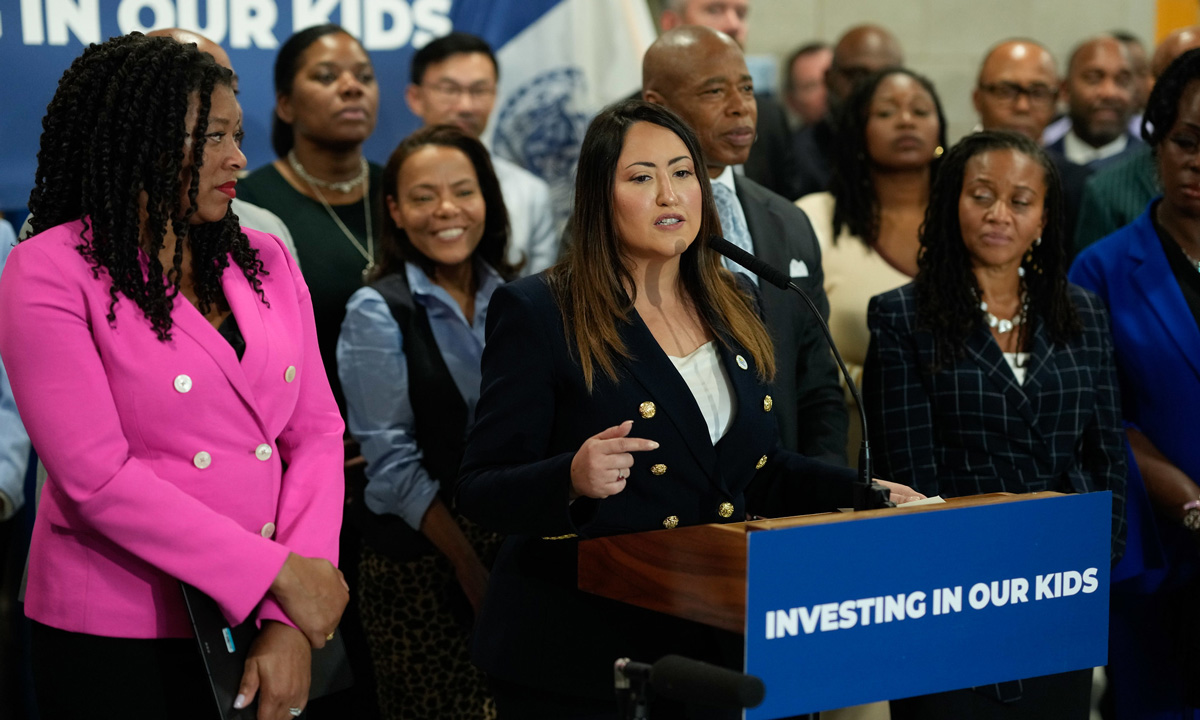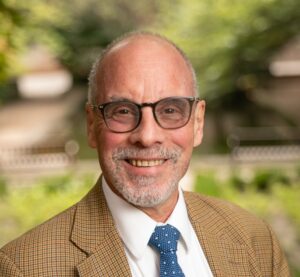Amid a Federal Probe, New NYC Schools Chancellor Could Provide Calm in the Storm
Bloomfield: By promoting a native New Yorker, embattled Mayor Eric Adams gives Melissa Aviles-Ramos credibility on the promise of stability.

Get stories like this delivered straight to your inbox. Sign up for The 74 Newsletter
The indictment and arraignment of New York Mayor Eric Adams cloud the unusual pre-appointment of Melissa Aviles-Ramos as city schools chancellor. Should she take office, as planned, on Jan. 1, Aviles-Ramos will succeed David Banks, for whom she served as chief of staff before becoming deputy chancellor for family engagement and community engagement.
While urban school districts like Los Angeles, Chicago and Boston have moved away from various forms of mayor-dominant governance, New York is a notable exception. Not only does the mayor appoint the schools chancellor and a majority of central school board members, he (mayors, so far, have all been male) controls the Department of Education budget and negotiates all union contracts. Through the chancellor, the mayor also appoints all 38 local district superintendents and approximately 1,700 principals.
Through the years, Democratic and Republican mayors, affirmed by bipartisan support in Albany, have supported this hegemonic model. But none have championed City Hall control like Adams. Former Mayors Michael Bloomberg and Bill de Blasio appointed trusted lieutenants with broad discretion to lead the schools, leaving policy and operations largely in their hands. There was obviously robust communication between City Hall and DOE headquarters in the old Tweed Courthouse, but under chancellors like Joel Klein and Carmen Fariña, policy ideas flowed as much from Tweed as to it.
Adams changed that. In appointing Banks — a longtime political partner — to the chancellorship, Adams promoted a strong Science of Reading curriculum and a signature dyslexia screening program. Banks, whose only experience was in high school teaching and administration, was a strong figurehead for this movement but not its instigator. A ballyhooed “Pathways” career-preparation initiative was lifted from the Bloomberg playbook and, until her recent departure, was run by an ex-Bloomberg Philanthropies executive. New programs in special education and recent organizational restructuring appear to have arisen from within the DOE. But now, amid a federal corruption investigation into Adams’s campaign contributions, Banks has announced he will step down at the end of the year.
With the appointment of Aviles-Ramos, which Adams announced just hours before he was indicted on Sept. 25, the mayor’s dominance in educational policy is even more pronounced. Instead of the usual promises of change, Aviles-Ramos’ initial comments were not only effusive in gratitude to Adams and Banks, but committed to “stability” and “continuing the work that began under [Banks’s] tenure.” While this reassurance is important under the circumstances of an administration under broad legal attack, it is also unusual. Generally, new school superintendents arrive with the glow of change and new possibilities, promising a new agenda rather than continuity. It’s in their leadership blood and an astute political move to not be associated with shortcomings of a predecessor, even within the context of pre-existing appointive authority of a school board or mayor.
But the promise of continuity is a double-edged sword for parents and students attending New York’s public schools. Confidence is a major issue. Investigations are swirling around the administration, including reported suggestions of contract malfeasance against Banks — whose home was raided and electronic devices seized by federal officials. Banks has denied any wrongdoing.
Having served as Banks’s chief of staff, Aviles-Ramos is justifiably seen as part of a tainted leadership. “What did she know and when did she know it?” is a fair question. At a moment when parents are reluctant to force the issue of student attendance (chronic absenteeism rates hover above 35%), feeling that the schools are mired in corruption is hardly an incentive to send your kids to school. Parents will be seeking a leader, not a puppet, and it remains to be seen if Aviles-Ramos can deliver on that desire.
On the other hand, it’s refreshing to have an incoming chancellor with a deep knowledge of the school system. Aviles-Ramos, a Spanish-speaking Latina, has been a New York City public school student, teacher, principal, acting superintendent and senior executive, mostly in the Bronx. She ran the system’s response to the recent influx of migrant students. New York is the nation’s largest school district, with almost 1 million students, and more than twice the size of Los Angeles Unified, the second-largest. By promoting a native New Yorker from within, instead of following the common strategy of bringing in a distinguished outsider, and providing her with a three-month on-ramp, Adams gives the new chancellor credibility on the promise of stability. Parents and teachers may rejoice in knowing that the reading and math curricula established under Banks will continue. While they may not all love the substance of these reforms, nothing drives those who inhabit actual classrooms crazier than sudden policy shifts driven by those at the top.
Even more than is usually the case, the new chancellor’s success will depend a lot on matters outside her control. But her ascent is a test of a different national paradigm for an urban superintendent: promoting centralization over decentralization, continuity over change, insider over outsider. And, in this hour of crisis, Eric Adams has sought to bring a novel spirit to American urban education: calm. Perhaps Melissa Aviles-Ramos is the woman to do that job.
Get stories like these delivered straight to your inbox. Sign up for The 74 Newsletter

;)
